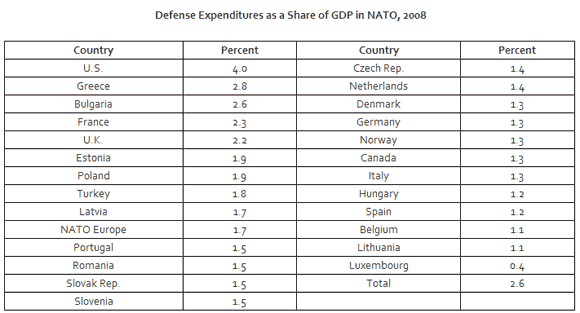The Washington Post has an important column today by David Ignatius on the concerns that senior members of the military have about our national debt and those of our allies. It’s easy to see why this is the case from the following table. It shows two things. First, our defense spending as a share of the economy is far above our allies. As pressure to deal with our debt situation mounts, it is inevitable that there is going to be massive political pressure to cut the defense budget. Second, given the low level of defense spending by our allies, many of which are struggling to deal with debt problems worse than ours, there is no possibility that they will be able to pick up the slack if we are forced to pull back our defense commitments.

Source: NATO
One thing that occurred to me as I read the Ignatius column is that those Republicans primarily motivated by national security and foreign policy ought to be among the strongest supporters of higher taxes. If taxes are not on the table–the non-negotiable position of all Republicans today–then this will certainly mean larger and deeper cuts in defense spending when deficit reduction becomes an issue that can no longer be put off. It’s simply unrealistic to think that Congress is going to impose massive cuts in domestic discretionary programs and leave national defense unscathed.
My national security-minded friends should also ask themselves how much longer they feel comfortable having China as the largest holder of our debt. And keep in mind that China will likely be increasing its holdings of dollar-denominated assets as euro-denominated assets have become significantly less attractive to the financially ultra-conservative Chinese. There is simply no place left except the U.S. for the Chinese to invest their vast hoard of dollars.
Furthermore, it’s inevitable that the Chinese are going to be increasingly interested in investing their funds in things other than Treasury securities. But as they look to buy American land, businesses and other assets they are going to confront not just legitimate national security concerns, but Xenophobia as well, which will certainly sour relations between our countries.
It’s worth remembering that our government’s fiscal profligacy is mirrored by the profligacy of our citizens, who do not save enough to finance domestic investment and appear loathe to reduce their consumption in order to save more. When any nation cannot finance domestic investment from domestic savings it has only two choices: import the saving and become indebted to foreigners or reduce domestic investment, which will lead to a lower standard of living.
So far we have been able to import all the savings we need. This shows up in our international accounts as a trade deficit since imported goods and services are the tangible representation of the imported saving. However, the trade deficit also impedes domestic growth–net exports (exports minus imports) reduce the gross domestic product dollar-for-dollar. Thus insofar as Americans are buying imports they are reducing domestic growth. (This is not an argument for trade restrictions, for reasons I won’t go into now, just a simple fact of national income accounting.)
Thus to the extent that the budget deficit reduces national saving and requires us to import saving to finance domestic investment, it increases the trade deficit and increases the financial power of foreigners over our affairs. Therefore, the debt and the deficit are legitimate national security concerns.
For these reasons, Republicans primarily concerned about national security ought to be in the forefront of efforts to raise revenues to reduce deficits, free up domestic saving for domestic investment, and reduce the importation of foreign saving and the trade deficit. But so far they are not. They remain loyal to the Republican obsession with tax cuts and a refusal to raise taxes in any way for any reason. However, I think my national security-minded friends are soon going to discover that massive defense budget cuts will necessarily be a big part of the price that will be paid for not raising revenues.


Bruce, you have revealed the iron triangle. You can't have a balanced budget AND low taxes AND high defense spending.